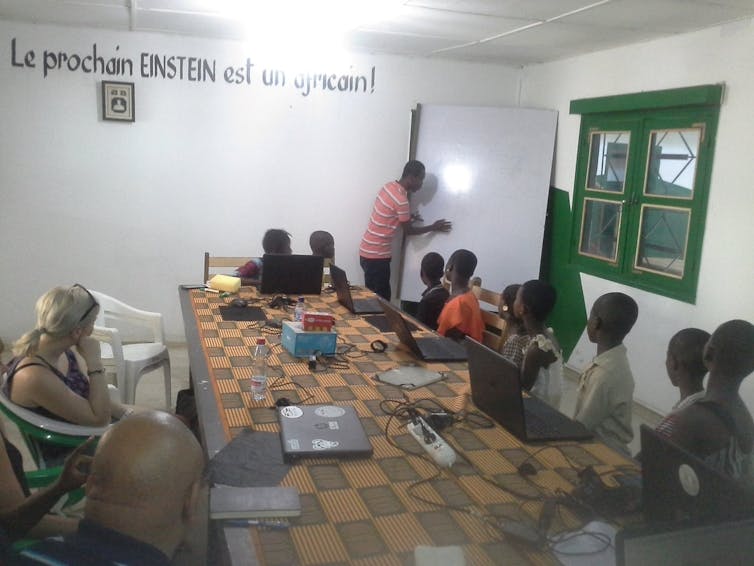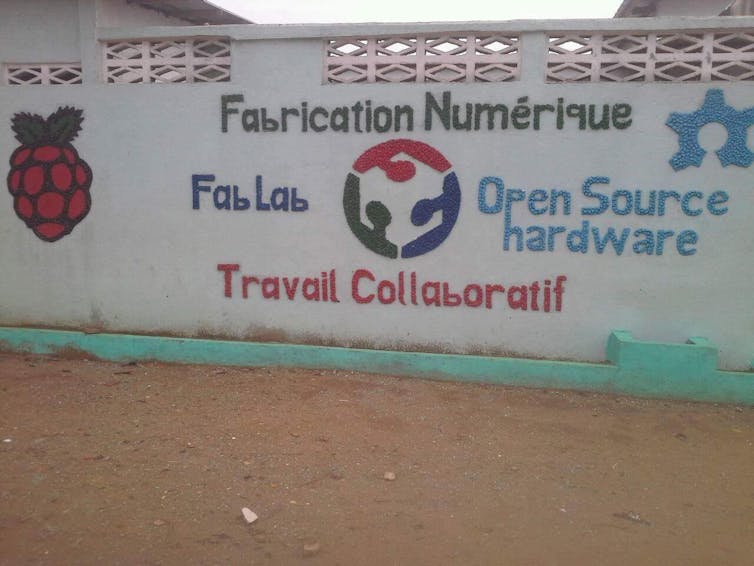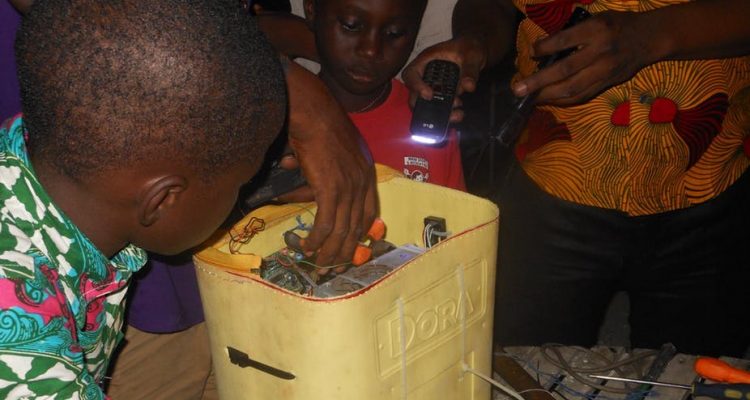Serving at the same time production, creation and prototyping workshops, practice-based training sites and social link facilitators, fab labs help to reduce the traditional frontal opposition between “knowing” and “doing” .
The fab lab wave originated in the United States in 1998 under the leadership of Neil Gerhenfeld, a professor at MIT. These are workshops designed to be open, shared and collaborative. Their goal is to provide a physical space, bringing together digital tools (laser cutting, 3D printers, etc.) whose use is common, to allow an individual to create, to invent. They allow to design, prototype, manufacture and test various objects.
These workshops take on a particular meaning in Africa where they become relays for the development of commons for educational purposes.
The specificity of African fab labs: educational commons
While the countries of sub-Saharan Africa have made considerable progress in developing their education systems, the initial delay and the very high population growth mean that the region still has 50 million out-of-school children at the age to be in primary school or in high school. To these difficulties of access are added the very strong challenges of the equity and the quality of the educations given to the pupils.
Fab labs in sub-Saharan Africa are very diverse, but they set educational goals more clearly and systematically than their counterparts in developed countries.
Many of them offer workshops not only for children and adolescents, but also for students, to compensate for the under-equipment of universities, or for women, to facilitate their social and professional integration. Beyond the training aspect of the youngest in the basics of electronics, or even digital manufacturing, the educational project aims to respond to local societal issues.
Sésamé Koffi Agodjinou, founder of WoeLab in Togo, anthropologist and architect by training, sees in fab lab a way to rethink with and for citizens a city that is traditionally designed by the only urban planners. In line with vernacular architecture that offers a vision of the city as a village, fab lab proposes a place and moments that create cohesion, symbolically, a new initiation pen for young people.

Babylab: fab lab in Ivory Coast. Guiako Obin, Author provided
For its part, Guiako Obin, creator of Babylab in Ivory Coast, chose a very popular town of Abidjan, marked by poverty and insecurity, to make fab lab a lever of social transformation through education and fight against idleness and delinquency of young people.
Finally, Blolab in Benin, created by Médard Agbayazon, aims to promote digital literacy for young people and local professionals (artisans, farmers) and help them build inexpensive solutions, easy to access and fast for their development. Here the ingenuity of the members of the fab lab community, inspired and supported by global information resources, provide solutions adapted to local needs. For example, the lab has developed a whistleblower application for gender-based violence.
Frugal innovation and hacking at the heart of the device
With more than forty places, we can only confirm the vitality of this movement on the African continent. The fab lab is a new place of innovation that, in difficult conditions, often uses self-help and relies on the creativity and strong will of its promoters.
In the workshop, the production itself also faces the challenge of weak financial and material resources available. Fab lab communities, as part of frugal innovation, strive to meet local needs with simple and tailored solutions. They also use online resources such as directions for use, building instructions, communities of practice and crowdfunding sites.

Facade of fab lab. Guiako Obin, Author provided
Witness the initiative “Jerry Do-It-Together”, which organizes workshops to build Linux computers from recycled electronic components fixed in a jerrycan of 20 liters. Users, designers and hackers gather around Jerry computers to learn how digital is made and geared to their needs.
The growing movement of African fab labs is driven by a desire to share knowledge and open innovation: in Africa as elsewhere, they question the usual ways of production, education, intellectual property and, more generally , we question the place of the citizen in economic and societal projects.
How are these spaces common?
Entrepreneurial, associative, public, university, fab lab illustrate how the theory of commons can inspire production activities. Since the awarding of the Nobel Prize in Economics to Elinor Ostrom in 2009 for his work on Common Pool Resources, the commons are experiencing an unprecedented craze. They refer to the collective management of a resource by a community that sets ad hoc rules and establishes a governance structure allowing the distribution of different levels of rights and obligations and the resolution of conflicts.
The goal of the community is at the heart of doing it together. In the case of commons structured around a natural resource, it is often, but not always, the preservation in quantity or quality of the resource. This inherited definition of the traditional commons (agriculture, pastoralism, fishing) extends for a whole new generation of commons, the so-called informational commons, the objective of which is on the contrary the sharing, the dissemination and the enrichment of the good. objective of “additionality”.
The fab labs are thus carriers of this dynamic. The site aims at the development of digital knowledge, its dissemination, its sharing (network), its preservation (library and web platforms). It brings together machines but also experiences. It contributes to the accumulation of knowledge and the transfer of knowledge through training programs. Knowledge is therefore both a component of fab lab but also an objective.
These are places that are part of both a territory, but also in multiple resources and online communities (free software, OpenStreetMap, social networks). This duality of the physical and digital communities is translated by a double movement: a re-territorialization, via a local use, of digital commons developed on a global scale, and, moreover, a de-territorialisation of the knowledge generated within the fabs. lab for global use.
The Conversation


Leave a Reply